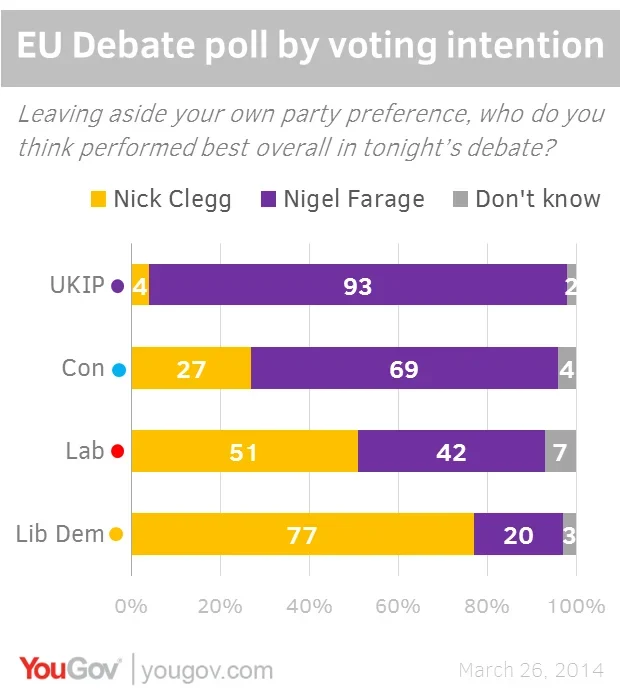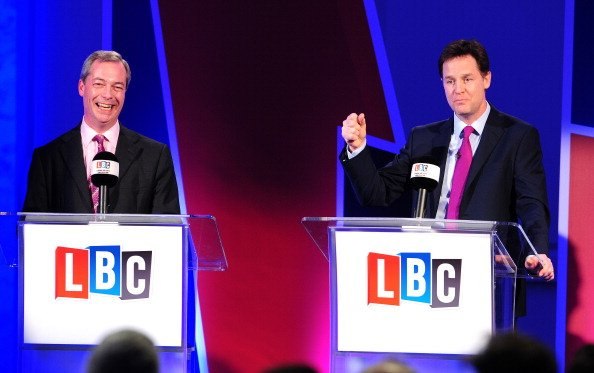Nigel Farage emerged as the clear victor in his first debate, hosted by LBC, on Britain and the European Union.
As in the leaders’ TV debates at the last election, YouGov polled 1,000 viewers and listeners for The Sun immediately after the debate. Overall, 57% thought UKIP’s leader performed better overall, compared with 36% for the Deputy Prime Minister.

Not surprisingly, almost all UKIP supporters preferred Farage. But he was also considered the winner by:
- 69% of Conservative supporters
- 42% of Labour supporters
- 20% of Liberal Democrats
- 30% of those who said before the debate they would vote to keep the UK in the EU
In contrast, Clegg was regarded the winner by only 27% of Conservatives, and only half of all Labour supporters, even though Labour and the Lib Dems are both pro-EU parties that reject a referendum in the near future.
As well as asking respondents who they thought performed better in the debate, we repeated a series of questions we put to the same respondents before the debate. In other words, our figures show the before and after debate views of the same people. Changes in the figures reflect real changes, not sampling fluctuations.
As a result of the debate,
- The balance of views on British membership of the EU shifted slightly, from 48-42% in favour, to 47-44%. In other words, Farage won the debate despite a narrow majority against UK withdrawal.
- There were increases in the numbers thinking that, outside the EU, Britain would have more jobs (up from 28% to 34%) and more influence (up from 11% to 19%). But in both cases, these Brexit-optimists were still outnumbered after the debate by those who thought things would get worse.
- On the broader question of Britain’s economy, and people’s own standard of living, the debate produced much smaller changes.
Our poll also gave support to the notion that both Clegg and Farage could gain from the debate. We asked people beforehand, and again afterwards, whether they had a positive or negative view of the two men. Farage turned his reputation round. Before the debate, his figures were 56% negative, 40% positive. Afterwards: the positives outnumbered the negatives by 52-46%.
Clegg’s gains were smaller, and from a lower base: from a negative 67-31% balance beforehand to 64-35% afterwards.
As this was an unusual survey, it’s worth setting out what we did.
Stage one: we surveyed 25,000 YouGov panel members on Monday and Tuesday. From this we identified 3,000 people who said they were likely to watch or listen to the debate and would be willing to take part in a survey immediately afterwards.
This group was skewed towards older people, more middle class people, broadsheet readers and also people who identified with UKIP.
Stage two: we re-contacted 2,200 from the 3,000. We selected our sample to be politically representative of Great Britain as a whole. We did NOT seek to correct the demographic balance of the sample.
Between Tuesday evening and Wednesday morning we invited these 2,200 to answer a short survey about their voting intentions, views about the EU and their broad attitudes to Clegg and Farage. At the end of the survey we confirmed that they would be invited to the post-debate survey. Just over 1,600 responded with their pre-debate opinions.
Stage three: we invited these panel members to complete the post-debate survey immediately after the debate ended. 1,003 completed this survey between 8.00 and 8.10. We weighted the raw data to (a) the voting intentions in our latest regular daily poll for the Sun (Lab 37%, Con 35%. UKIP 11%, Lib Dem 9%) and (b) to our most recent data on whether the UK should remain in the European Union.
An alternative approach would have been NOT to have corrected the political skew among our original 3,000 sample. The argument for doing this is that any assessment of audience reaction should take the audience as it is – in this case, accepting that UKIP supporters were much more likely to watch or listen to the debate than supporters of other parties. Had we done this, I estimate that the verdict of the audience would have been Farage 65%, Clegg 28%. Those who prefer to cite this figure, rather than to adjust for the UKIP-rich nature of the audience, are of course free to do so.
Image: Getty








